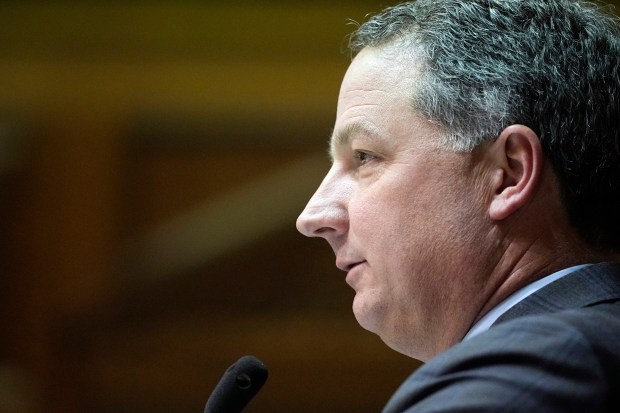Indiana legislators would like to redraw the Indiana-Illinois border to absorb parts of Illinois, but the proposed action would face roadblocks on the Illinois side, which would prevent a border shift, political officials and experts said.
Indiana House Bill 1008, authored by Speaker Todd Huston, would establish an Indiana-Illinois boundary adjustment commission to research the possibility of adjusting the boundaries between the two states. The commission would include five members appointed by the Indiana governor and five members appointed under Illinois law.
Huston, R-Fishers, said he decided to draft the bill after he learned that in November seven Illinois counties — Iroquois, Calhoun, Clinton, Greene, Jersey, Madison and Perry counties — voted to secede from the state. Each of those counties besides Iroquois County either border Indiana or are near Missouri.
Then, after further research, Huston said he learned that nearly three dozen Illinois counties have voted in recent years to leave the state. Based on those votes, Huston said he drafted the bill to look into shifting the border.
“These people literally went and voted. They have spoken,” Huston said. “Whether Indiana is the right solution or not, they’ve expressed their displeasure. We’re just saying, if you’ve expressed your displeasure, we’d love to have you.”
Speaker of the House Todd Huston, R-Fishers. (AP Photo/Darron Cummings, File)
Huston said he and his staff have reached out to Illinois officials, but he deferred to them to share what they thought about the bill.
Illinois State Rep. Brad Halbrook, R-Shelbyville, said Indiana officials haven’t reached out to him, but the proposed bill is interesting. Halbrook said he has drafted bills in the last three legislative sessions to create a new state.
“I think it’s an interesting concept that a neighboring state directly to the East of us understands the plight that Illinois citizens are in and have come up with this idea, this concept, to move the state lines,” Halbrook, a member of the Illinois Freedom Caucus, said.
Director of the Illinois Freedom Caucus Collin Moseley said the majority of the caucus supports the Indiana bill.
“It’s interesting that now we have a bordering state that is recognizing the tyranny of the majority that our downstate residents and taxpayers that feel totally disenfranchised and feel totally voiceless in our state. Indiana recognizes that this is sort of a hostage rescue mission,” Moseley said.
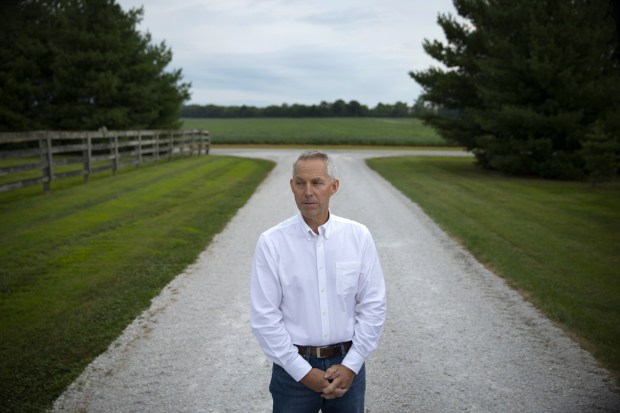
State Rep. Brad Halbrook, R-Shelbyville, at his home near Shelbyville, on July 29, 2019. Halbrook filed a resolution in the state legislature in which he and six co-sponsors asked the U.S. Congress to recognize Chicago as the 51st state. “I hear it a lot from my constituents, that we need to be separate from Chicago,” Halbrook says. “I thought yep, this is what we need to do.” (E. Jason Wambsgans / Chicago Tribune)
While some Illinois residents voted to secede from the state, they can’t take action on their own, said Indiana University Paul H. O’Neill School of Public and Environmental Affairs professor Paul Helmke.
The bill focuses on the politics, Helmke said, because the Illinois residents who voted to secede live in conservative Republican counties and they don’t like living in a Democratic-led state. The action faces an uphill battle, Helmke said, and it’s very unlikely that the Indiana-Illinois border will shift.
“It’s sort of a useless measure. Nothing exactly like this has happened in U.S. history before, and I think it’s unlikely to happen here,” Helmke said. “It’s an interesting idea, but it’s not going to go anywhere.”
For the boundary to change, the U.S. Constitution dictates that the Indiana legislature, the Illinois legislature and then Congress would have to approve the measure, Helmke said.
The Indiana legislature has a Republican supermajority and a Republican governor, so the bill has a chance of advancing this session, Helmke said. The bill was authored by Indiana’s Speaker of the House, he said, so that means the bill will likely advance through the legislature.
Republicans in Congress, with a slim majority, could possibly be convinced of this measure, Helmke said. But Illinois’ Democratic leadership won’t go for this move, so the chances of shifting the border die there, he said.
“If this passed in Indiana, I would be shocked if Illinois appointed anybody to this commission. It’s purely symbolic or performative on the part of the legislature at this state,” Helmke said. “It could pass here, it’s just not going to go anywhere in Illinois.”
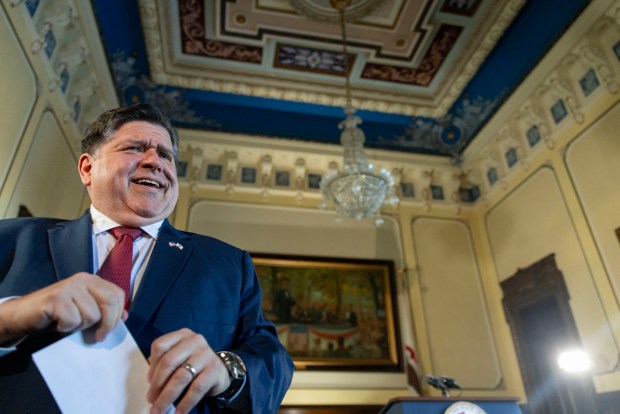
Gov. JB Pritzker brushed off the proposal — and fired back at the neighboring state — when he was asked about it at an unrelated news conference on Wednesday.
“It’s a stunt. It’s not going to happen,” Pritzker said downtown Wednesday. “But I’ll just say that Indiana is a low-wage state that doesn’t protect workers, a state that does not provide health care for people in need, and so I don’t think it’s very attractive for anybody in Illinois.”
Illinois residents voted to leave Illinois, Huston said, and Indiana would like to offer a solution. Since 2020, about 100,000 Illinois residents have moved to Indiana, so even more people “have voted with their feet,” Huston said.
“This is not something we dreamed up. This is not something where we’re being provocative. (Pritzker) needs to talk to the folks in those counties and understand what their dissatisfaction is. They clearly don’t agree with what his premise is and they need to have those conversations,” Huston said.
Shifting the border would require cooperation with the Illinois government, Huston said. While Huston said he doesn’t presume to know everything about Illinois politics, the fact that so many Illinois residents voted to leave the state speaks for itself.
“We’re just saying, if there’s an interest on this, we’d love to engage in those conversations,” Huston said. “Why wouldn’t we want to continue to reach out our hand and say, ‘Look, we’re open and available for these conversations’ with a group of people who are clearly dissatisfied with what’s taking place in Illinois.”
The Illinois Freedom Caucus recognizes that it’s unlikely Illinois would support redrawing the state border, Moseley said. But, the caucus will work to inform the Illinois legislature that many voters want to leave the state.
Illinois’ Democratic majority won’t be open to discussing redrawing the state boundary, Halbrook said. But, the Indiana bill will change the conversion about redrawing Illinois, he said.
When the Illinois legislature meets in the spring, Halbrook said he believes some Republicans will likely file a bill similar to what Indiana lawmakers are proposing.
“It won’t be a majority of the Republicans, but there will be some Republicans in Illinois that will embrace this idea and work with it,” Halbrook said.
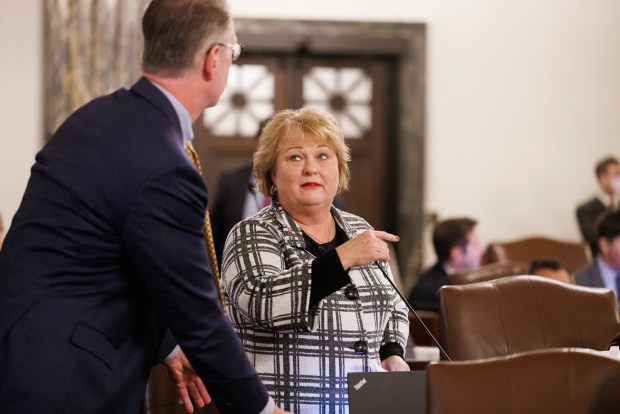
Illinois Sen. Terri Bryant, R-Murphysboro, said she hadn’t heard about Indiana House Bill 1008, but that she doesn’t support separating Illinois from itself.
“I want to fix Illinois. I don’t want to join another state,” Bryant said.
There have been two instances in U.S. history where states have created boundaries, but it was to create new states and not shift the border between two existing states, Helmke said.
In 1820, Maine was established as a state by taking land away from Massachusetts, which the Massachusetts legislature and Congress approved, Helmke said. The action was taken under the Missouri Compromise of 1820, which was during the pre-Civil War era and allowed Missouri to become a slave state and Maine as a free state, Helmke said.
“Back then, if you brought in a slave state you brought in a non-slave state to keep balance,” Helmke said.
Then, during the Civil War, West Virginia became a state by splitting up Virginia, Helmke said. At the time, Virginia seceded from the union, but President Abraham Lincoln didn’t recognize the succession, so a pro-Union faction of Virginia established West Virginia as a free state, he said.
However, the Indiana-Illinois border discussion isn’t the first time in recent history that a part of a current state has expressed interest in joining a neighboring state, Helmke said.
Multiple counties in Oregon have expressed interest in joining neighboring Idaho, Helmke said. But, without the approval of state legislatures, the movement has not advanced, he said.
A more practical border discussion between state officials has been when a river that borders two states changes course, Helmke said. Indiana and Kentucky, for example, have the Ohio River serving as their border, which has resulted in the two states changing the border line slightly as the river shifts, he said.
“This idea that you could take territory away from the State of Illinois and give it to Indiana, that has not happened before,” Helmke said. “Even the two that I mentioned, it didn’t take it away and give it to an existing state, it created the new state of Maine and the new state of West Virginia.”
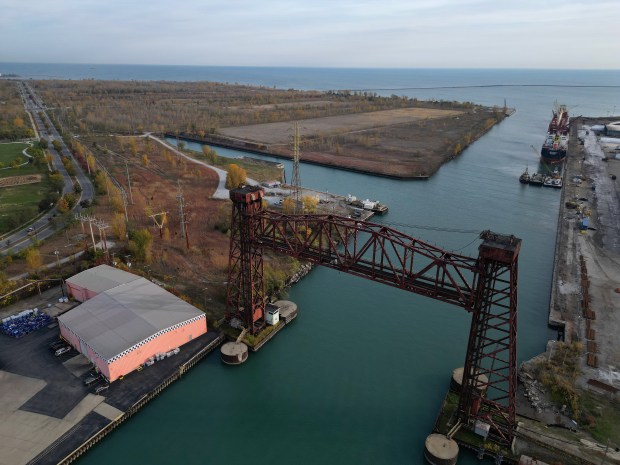
If the Indiana-Illinois border was redrawn, Helmke said the move would raise interesting policy questions because the two states have different property, income and sales taxes and different school systems, among other things. Presumably, the commission, if created, would review these things, he said.
Halbrook said the economic benefits would have to be looked at, but he believes Indiana’s economic standing would be appealing to the downstate Illinois counties that voted to leave Illinois. Indiana would likely absorb the public debt and pension liabilities that Illinois has, he said.
“How that’s done, how the systems are to be created in the new part of Indiana from Illinois, that’s just going to be part of the discussions,” Halbrook said.
Indiana has become a more attractive state to live because it is fiscally sound, stable and growing, Huston said. Illinois and Indiana are geographically aligned and have similar infrastructure, he said.
“We wouldn’t be talking about this if we didn’t feel like these counties are serious and we couldn’t make it work,” Huston said.


